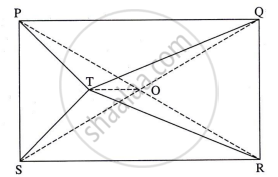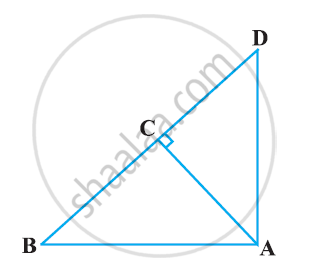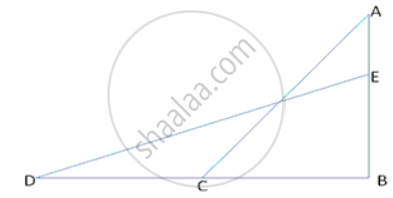Advertisements
Advertisements
प्रश्न
In the given figure, point T is in the interior of rectangle PQRS, Prove that, TS2 + TQ2 = TP2 + TR2 (As shown in the figure, draw seg AB || side SR and A-T-B)

उत्तर १
Construction: Through T, draw seg AB II side SR such that A-T-B, P- A-S and Q-B-R.
Proof:
seg PS || seg QR ...(Opposite sides of rectangle)
∴ seg AS || seg BR ...(P-A-S and Q-B-R)
also seg AB || seg SR ...(Construction)
∴ `square` ASRB is a parallelogram ...((By definition)
∠ASR = 90° ...(Angle of rectangle PSRQ)
∴ `square` ASRB is a rectangle ...(A parallelogram is a rectangle, if one of its angles is a right angle.)
∠SAB = ∠ABR = 90° ...(Angle of a rectangle)
∴ seg TA ⊥ side PS and seg TB ⊥ side QR ...(1)
AS = BR ...(2) (Opposite sides of rectangle are equal)
Similarly, we can prove AP= BQ ...(3)
In ΔTAS,
∠TAS = 90° ...[From (1)]
∴ by Pythagoras theorem,
TS2 = TA2 + AS2 ...(4)
In ΔTBQ,
∠TBQ = 90° ...[From (1)]
∴ by Pythagoras theorem,
TQ2 = TB2 + BQ2 ...(5)
Adding (4) and (5), we get,
TS2 + TQ2 = TA2 + AS2 + TB2 + BQ2 ...(6)
In ΔTAP,
∠TAP = 90° ...[From (1)]
∴ by Pythagoras theorem,
TP2 = TA2 + AP2 ...(7)
In ΔTBR,
∠TBR = 90° ...[From (1)]
∴ by Pythagoras theorem,
TR2 = TB2 + BR2 ...(8)
Adding (7) and (8), we get
TP2 + TR2 = TA2 + AP2 + TB2 + BR2
∴ TP2 + TR2 = TA2 + BQ2 + TB2 + AS2 ...(9) [From (2) and (3)]
∴ from (6) and (g), we get,
TS2 + TQ2 = TP2 + TR2
उत्तर २
Construction: Draw diagonals PR and QS and let them intersect at 0. Draw seg TO.

Proof: `square` PQRS is a rectangle ...(Given)
∴ PR=QS ...(Diagonals of rectangle are congruent)
Multiplying both the sides by `1/2`, we get,
`1/2`PR = `1/2`QS ...(1)
But, `1/2`PR = OP = OR ...(2)
and `1/2`QS = OS = OQ ...(3) [Diagonals of rectangle bisect each other]
∴ OP = OR = OS = OQ ...(4) [From (1), (2) and (3)]
In ΔTSQ,
seg TO is the median ...(By definition)
∴ by Apollonius theorem,
TS2 + TQ2 = 2TO2 + 2OQ2 ...(5)
In ΔPTR,
seg TO is the median ...(By definition)
∴ by Apollonius theorem,
TP2 + TR2 = 2TO2 + 2OR2
∴ TP2 + TR2 = 2TO2 + 2OQ2 ...(6) [From (4)]
∴ from (5) and (6), we get,
TS2 + TQ2 = TP2 + TR2
Notes
Students can refer to the provided solutions based on their preferred marks.
संबंधित प्रश्न
The perpendicular AD on the base BC of a ∆ABC intersects BC at D so that DB = 3 CD. Prove that `2"AB"^2 = 2"AC"^2 + "BC"^2`
In Figure ABD is a triangle right angled at A and AC ⊥ BD. Show that AC2 = BC × DC

In an equilateral triangle ABC, D is a point on side BC such that BD = `1/3BC` . Prove that 9 AD2 = 7 AB2
Find the length of the hypotenuse of a right angled triangle if remaining sides are 9 cm and 12 cm.
In right angle ΔABC, if ∠B = 90°, AB = 6, BC = 8, then find AC.
In a rectangle ABCD,
prove that: AC2 + BD2 = AB2 + BC2 + CD2 + DA2.
Prove that `(sin θ + cosec θ)^2 + (cos θ + sec θ)^2 = 7 + tan^2 θ + cot^2 θ`.
In triangle PQR, angle Q = 90°, find: PQ, if PR = 34 cm and QR = 30 cm
Find the Pythagorean triplet from among the following set of numbers.
2, 6, 7
Find the Pythagorean triplet from among the following set of numbers.
9, 40, 41
From the given figure, find the length of hypotenuse AC and the perimeter of ∆ABC.
The foot of a ladder is 6m away from a wall and its top reaches a window 8m above the ground. If the ladder is shifted in such a way that its foot is 8m away from the wall to what height does its tip reach?
From a point O in the interior of aΔABC, perpendicular OD, OE and OF are drawn to the sides BC, CA and AB respectively. Prove that: AF2 + BD2 + CE2 = OA2 + OB2 + OC2 - OD2 - OE2 - OF2
In a triangle ABC, AC > AB, D is the midpoint BC, and AE ⊥ BC. Prove that: AC2 - AB2 = 2BC x ED
A point OI in the interior of a rectangle ABCD is joined with each of the vertices A, B, C and D. Prove that OB2 + OD2 = OC2 + OA2
AD is perpendicular to the side BC of an equilateral ΔABC. Prove that 4AD2 = 3AB2.
The perimeters of two similar triangles ABC and PQR are 60 cm and 36 cm respectively. If PQ = 9 cm, then AB equals ______.
A flag pole 18 m high casts a shadow 9.6 m long. Find the distance of the top of the pole from the far end of the shadow.
In a triangle, sum of squares of two sides is equal to the square of the third side.
Jiya walks 6 km due east and then 8 km due north. How far is she from her starting place?
